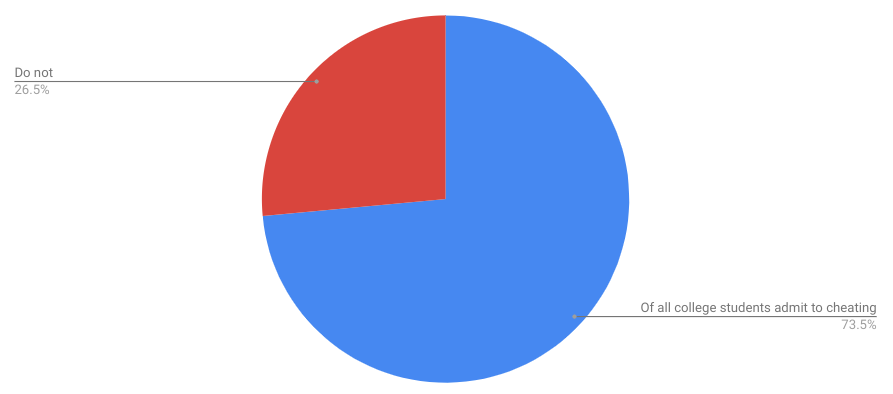Under Pressure: Students use cheating as easy way out


Sophomore Mandi Warren demonstrates a popular cheating method.
Underneath the hum of the heater, students’ pencils scratch at Scantron sheets while the teacher looks over her desk at the rows of students in front of her. Hidden below the desks, over half the kids open their phone to a Quizlet with test questions.
It’s a scene students and teachers are all too familiar with. A study conducted at Stanford University in 2018 showed that 75-98 percent of all college students admit to cheating during their high school years, a pattern that has been proven to continue into college, with 73 percent of college students and faculty saying that they think everyone cheats at some point.
Contrary to popular belief that cheating is for struggling students, research shows that it occurs both in students with the lowest grade point averages and the highest grade point averages as well, but if tests are truly meant to help kids succeed and judge their knowledge over a specific topic, why do kids look for the easy way out?
Junior Sofia Munoz said that cheating is often used as a failsafe in order to avoid a bad grade. “I think cheating can be a last resort of some because people are preparing for other classes and do not have enough time to get the work done for the class at hand,” Munoz said. “Time management is a common problem for me and other students.”
Senior Jamie Knox agreed with Munoz, and said that she believes students are really just trying to end with a good grade, but cheating should be punished. “I think much of it has to do with kids not studying or they didn’t understand what they had been taught,” Knox said. “If someone is caught cheating, I think that they should fail the test and have to come in and talk to the teacher about why it happened.”
Munoz agreed, saying that when students are prepared they are less stressed and not as willing to cheat if they know the material. “I think teachers that prepare students well for tests do things like reviews in class, study guides with relevant information and revisit information that was previously learned,” Munoz said. “Many teachers do this, but others do not and expect students to just retain the information or study vigorously without prompt.”
Sophomore Mandi Warren said that she thinks before test preparations are the best way to avoid cheating. “I think students use cheating as an easy way out instead of actually learning the material they are being tested over,” Warren said. “I’ve noticed taking CFA’s in advance of the test date helps me out because that way I know I’m learning the material before I have to be put to the test, and I think this helps to lessen cheating as well.”
Spanish teacher Christine Gruhn said that cheating is something that depends mostly on students and their character. “A person’s integrity is so important—more important than a score or grade, in my opinion—so I take it pretty seriously, and I wish more students would,” Gruhn said. “I try to remind students that honor and integrity are so much bigger than a point or two on an assessment, and that it’s important for me to see what they know so that I can give them appropriate feedback for growth.”
Gruhn also said that technology is beginning to play a larger role when it comes to academic integrity. “To try to prevent cheating, I may also have students take off Apple Watches. In world languages, we also avoid assessing online with Schoology or other technology because it’s too hard to make sure students don’t open a translate tab or just choose ‘yes’ when Google so graciously offers to translate the page,” Gruhn said.
Not only has technology played a large role in grading and the prevalence of cheating, but the new standards based grading system is also influencing changes as well. Junior Sofia Munoz said that to her, the new grading system has been more helpful, but can cause a little bit more stress. “I think standard based grading helps grades because there is a wider range of what is acceptable for a 4 and a 3, so students can be more successful,” Munoz said. “It can be hurtful though when having one 3 can take your grade down to where it doesn’t deserve to be. Also, since we are so used to the point based system, not having a constantly updating grade to see where you are at can be nerve-racking for many students.”
When it comes to punishment, the consequences for cheating are severe. The student handbook says that “Repeat offenders may be subject to loss of credit for a project or test, lose class credit, be suspended or be recommended for expulsion.”
Munoz said that she thinks sometimes punishment is too severe. “If they are cheating, I think the student should have to retake the test or assignment under close watch so they can not attempt to cheat again. I have heard of students in in-school suspension for cheating, and that seems a little extreme in my opinion,” Munoz said.
Warren disagreed and said that students should be held accountable for their actions if they are repeat offenders. “I think if the student has been seen multiple times cheating, they should be punished and get a zero, especially when the teachers help so much to prepare you, and there’s power hour to go see the teacher if you don’t get it. If there are no consequences, the student will never learn, ” Warren said.
Warren said that doing what is right should always come first, no matter what grade one might end up with. “I’ve seen cheating at both the high school and the junior high, and this pattern seems to continue in each grade,” Warren said. “I think that students should try to remember that colleges, teachers and parents care more about what kind of person you are at the end of the day rather than your grade on one test. Students should think about more about who they are and what they want to be known for, not about a silly grade they’ll probably forget about by next year.”

75% of all college students admit to cheating at one point in high school.









You must be logged in to post a comment Login